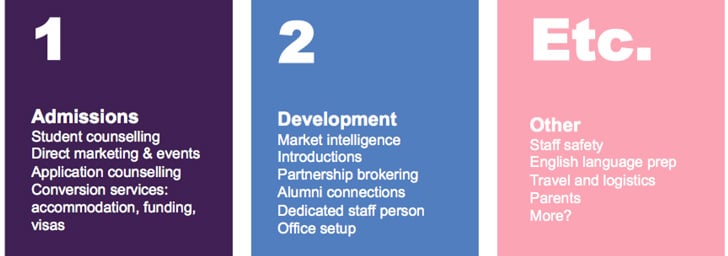Survey shows growing interest in education agents among US colleges
International students, already so key to the internationalisation goals and revenue streams of many American institutions, seem poised to become even more important in the world’s leading study destination. US colleges and universities are facing increasing pressure to hit recruitment targets, and anxiety about not meeting them is creeping up. This is according to the 2014 Survey of College and University Admissions Directors, an exercise conducted annually by Inside Higher Ed. In the 2014 edition, there has been a slight uptick in the percentages of surveyed directors who reported:
- Not meeting their enrolment targets by May 1 (just under 60% in 2013, 61% this year);
- Anxiety about meeting their targets (46% “very concerned” last year, 47% this year);
- Recruiting students already committed to other institutions (29% last year, 32% this year), a practice banned by NACAC.
Private baccalaureate college directors manifested the most concern. Last year 59% reported not meeting their targets, whereas 71% did not this year. Close to 6 in 10 (57%) were “very concerned” about not meeting their targets, compared to the average of 47% across all surveyed institutions. While the increases in institutional directors’ concerns seem marginal, the issue is that their concerns were already at high levels leading into this year. This suggests that the pressures American higher education institutions are experiencing in terms of maintaining targeted enrolment levels, and perhaps more broadly, sustainable levels of operations and revenues, show no signs of abating.
New strategies for challenging times
One sign of the increasing pressure that American colleges are under with respect to enrolment targets is the developing trend of favouring “merit”- based scholarships (i.e., for academic or other types of achievement) over need-based programmes (i.e., for low-income students who might otherwise not be able to attend college) in their admissions processes. Merit-based scholarships tend to go to wealthier students, and because they tend to be more modest, they bring in more revenue to the institution than need-based ones do. The problem is that some institutions are using funds reserved from cutting down on need-based scholarships to free up room for awarding merit-based scholarships, which threatens the access lower-income students have to higher education. And yet, more than half (55%) of the admissions directors surveyed said they would focus their recruiting on students who might accept merit scholarships. At the same time, however, students and their families are increasingly worried about debt, which is having adverse effects on enrolments of course. There is evidence that college admissions directors feel they have no way to decrease the pressure of debt on students. Inside Higher Ed notes:
“A majority of college admissions directors believe ‘gapping’ – in which colleges admit students but do not give them enough aid to enroll, frequently resulting in the students taking out private loans with few borrower protections – is both necessary and ethical for their institutions.”
Growing interest in international agents
With such domestic enrolment challenges to face, it is no surprise that American institutions are increasingly interested in recruiting international students to their campuses, and that international agents may play a greater role in further building the international enrolment base in the US. As we have noted previously, there have been important policy and practice developments with respect to agents in the US in recent months, notably the decision by the National Association for College Admission Counselling (NACAC) to remove its ban on international agents and a greater emphasis on supporting US institutions in effectively engaging with agents. The Inside Higher Ed survey of admissions directors found that 19% of reporting institutions now use international education agents and that 19% more are thinking about doing so. A quarter of them said that it was NACAC’s repeal of the ban that is making them think about using agents.
Across the pond
Indeed, agents already play a more significant role in recruiting for other major global destinations, including the UK, Australia, and Canada. This experience was in the spotlight at a special panel discussion on agents at the annual NACAC conference last September, during which the British Council’s Tamsin Thomas passed on some important insights on the role of agents in UK recruitment.
She explained that agents provide a number of important services to British institutions, most of which are summarised in the following table. Ms Thomas especially highlighted the additional recruitment capacity that education agents represent as well as the important role they play in extending the counselling and support services that can be provided directly by institutions. Such supports, she noted, are particularly important for newly arrived and/or first-year international students.

The drive to better practices
However, even in markets where the use of agents is far more entrenched relative to the US, there have been calls for improved standards and practices in working with international agents, most recently and prominently via The Observatory on Borderless Higher Education’s (OBHE) paper The agent question: insights from students, universities and agents. In addition, there is an expanding field of agent training programmes, certification schemes, and best practice resources that combine to support improved selection and quality assurance and to promote effective institution-agent relationships. Most recently, a new study published with the support of the British Council - Managing International Student Recruitment Agents: Approaches, Benefits and Challenges - calls for greater self-regulation and transparency by British institutions in their dealings with international agents. “Universities use agents both because of their strategic commitment to international student recruitment and because of the distinctive roles and functions of agents,” says the report. “The former relates to the need/demand for increasing numbers (and/or diversity of international students) in the institution and the direct resource available to the International Office or recruitment centre. The latter includes the unique resources agents can bring, and the functions/services they provide for both universities and prospective students.” In commenting on the report, however, Times Higher Education notes, “Interviews with university staff found widespread variance in recruiting, training, monitoring and rewarding of agents. The [study authors] say that action is necessary to reduce the potential for mis-selling and fraud by agents and to ensure that universities do not suffer financial loss or reputational damage.” Failure to act, says the study, could result in the British government imposing additional regulation on the sector. The study culminates in a series of ten recommendations for British institutions, including the following:
- Further training for international office staff on working with agents;
- An annual audit to assess agent activity and ensure that working practice are in line with established standards;
- Improved due diligence in agent selection and appropriate legal advice to inform the formation of new agency relationships;
- Improved training and support for international agents;
- Prioritising the interests of current and prospective students in all dealings with agents.
Meanwhile in America
In September, the NACAC International Advisory Committee released its own best practices guide: “International student recruitment agencies: a guide for schools, colleges and universities”. The guide is meant to expand on and illustrate the key principles of accountability, transparency, and integrity that are at the centre of NACAC’s newly released policies on international agents. The association intends to build on this initial resource by offering webinars for US institutions on working with agents, sharing samples of agent contracts and other relevant documents among its members, and, in early 2015, publishing a further resource guide for international students and parents to educate them about working with education agents. Other stakeholders in the US, notably the American International Recruitment Council (AIRC) have supported NACAC’s call for greater accountability, transparency, and integrity in relationships with agents. Along with a sophisticated certification scheme for international agents, AIRC has also contributed considerably to guidance for US institutions in working with international agents and to the development and promotion of best practices. It seems clear that international agents will now begin to play an expanded role in recruiting for US institutions. But it seems equally clear that agents and institutions alike will have the benefit of expanded training and other supports, as well as improved practice guidance, to help shape effective working relationships with one another.














